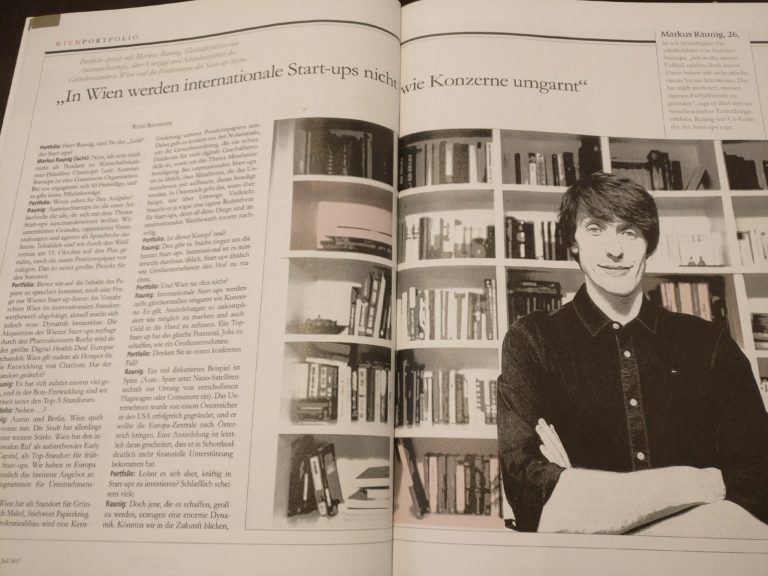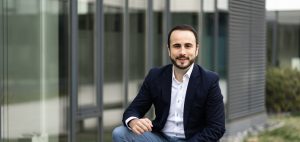“We need to do more to court international startups”
Ruth Reitmeier
Profil Portfolio spoke with Markus Raunig, Head of AustrianStartups, about Vienna’s advantages and flaws as a location for founders and challenges of the startup scene.
Portfolio: Markus, are you the “Leitl” of startups?
Markus Raunig (laughs): Not at all, I don’t see myself as an equivalent to Christoph Leitl, President of the Austrian Economic Chambers. AustrianStartups is a grassroots movement from the startup community with no compulsory membership fees.
What are your key responsibilities and tasks?
Markus: AustrianStartups is the first stop for anyone interested in startup topics. We support founders, organize events, and act as the voice for the startup scene. Currently we are working on a new position paper to be ready by the forthcoming election on 15th October. This is our big project during the summer.
Before discussing the key points of the new position paper, a more general question about the Viennese startup scene: Last year, Vienna seemed to fall behind in the race for best location, but now things are looking up. The acquisition of the Viennese startup mySugr by Roche is the largest digital health startup deal in Europe. The city is also a hotspot for chatbot development. Is there a turnaround?
Markus: Indeed, a lot happened recently, and in bots development Vienna is one of the top 3 locations worldwide.
Among …?
Markus: Austin and Berlin. Vienna is at the forefront of things. However, the city has another strength. Vienna has an international reputation as a top location for early-stage startups. In Europe, we have probably the widest range of support programs for company founders.
Vienna also has flaws as a startup location. Red tape?
Markus: Bureaucracy will be a key point in our new position paper. It will deal specifically with the notary act, trade regulation, which is a real obstacle to many digital business models, and the topic of employee participation. In international startups employees joining the company during the take-off and growth stages usually have share options as part of their salaries. In Austria this is only possible, if at all, by taking contractual detours. Perhaps, a new legal form for startups would be needed. The current situation is enormously disadvantageous when competing internationally.
Is this fight for real?
Markus: Absolutely. Cities compete for the best startups. Internationally, it is quite common to court a successful startup just like a big corporation.
And Vienna?
Markus: International startups are not courted the same way as corporations. It is necessary to make founding and the allocation of grants as uncomplicated as possible. A top startup has the same potential to create jobs as a large company.
Are you thinking of a specific case?
Markus: A frequently discussed example is Spire. (Spire uses nano-satellite technology to locate lost aircrafts or containers). Spire, was successfully established by an Austrian over in the US, and he wanted to set up the European headquarters in Austria. But he finally chose Scotland as a location where he received significantly more financial support.
Is it worth investing heavily in startups? Ultimately, many fail.
Markus: But those that manage to grow, generate a tremendous dynamic. Looking into the future, some of today’s startups will be among the largest companies in the country. And it is also very important what happens after the startup stage. Runtastic is a good example of this: the founders are key investors in other startups and they share their know-how as mentors.
The requirement of the startup scene for tax relief for venture capitalists remains unfulfilled. Written off?
Markus: No, this point will definitely be in our new paper. In Austria we have hardly any large-scale financing, because private investors do not have the option to write off losses. In Austria there is enough money available and it would be a pity, if we do not manage to win more investment for startups.
The Viennese scene is criticized as too focused on lifestyle. Is there something to this?
Markus: This image of the startup scene really annoys me. It does not reflect reality. Building up a company is hard. It takes a lot of hard graft and it is a roller coaster of emotions. One day, you are on top of the world believing that your wonderful idea is all conquering. But it can be all over the next day, because you get a cancellation. To get through that you need a lot of grit and a lot of belief in what you are doing.
This interview is a slightly adapted version of the original text published in German, in profil Portfolio July 17th, 2017
Read the original version here:
http://ruthreitmeier.com/App_Upload/Filemanager/630/NEWS/profil%20portfolio_Wien_Startups_RR.pdf





